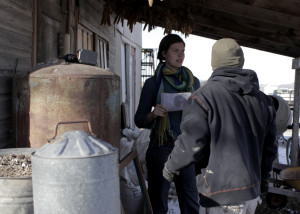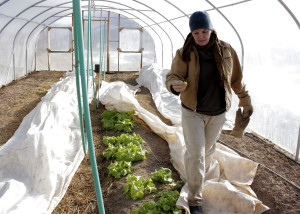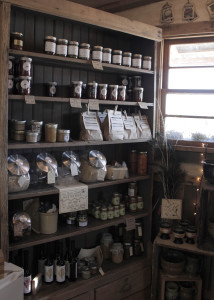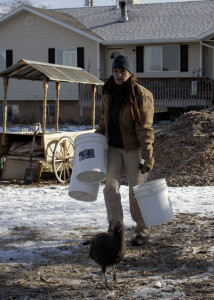FEATURE — Cedar City food rights activists Sara and Symbria Patterson will take to the state capital this month to fight for food freedom alongside Rep. Marc K. Roberts, R-District 67, empowered in part by a scholarship awarded them for their successful lobbying for cow-share property rights in 2015.

The Red Acre Farms CSA were named recipients of the first-ever national Gravel Road Gang Activism Scholarship, according to a Jan. 6 news release from Farm-to-Consumer Legal Defense Fund President Pete Kennedy.
“The Pattersons will receive a $2,000 scholarship,” Kennedy said in the press release. “Money they intend to put toward the passage of a food freedom bill to be introduced in the Utah legislature next month.”
The tenacious, young “urban farmer in the middle of nowhere,” as Sara Patterson calls herself, started her community supported agricultural farm, Red Acre Farm, when she was just a teenager. Since then, she and her mother have been a food-freedom force to be reckoned with.
Proposed 2016 Utah Food Freedom Act
Food laws have become so ridiculous, Symbria Patterson said, that many people have no idea they are even breaking them.

“Like, people garden and they bring lettuce to the market,” Symbria Patterson said. “But if they’ve washed it, it’s illegal, if they take the tops off their carrots it’s illegal.”
If the proposed 2016 Food Freedom Act passes, Sara Patterson said, grass-roots mom-and-pop cooks and bakers could sell their goods without breaking laws.
Currently, even a child who brings sugar cookies to the farmers market for a fundraiser must be turned away under the current food law statutes, Symbria Patterson added.
Everything baked for consumption sales must be made in a dedicated kitchen separate from the household kitchen, Symbria Patterson said. All recipes must be preapproved by the Utah Department of Agriculture and Food and if the family has a single pet in the home they cannot get a cottage food license.
To be specific, among other requirements, the code currently prohibits a cottage food licensee from conducting domestic activities in the kitchen when producing food; allowing pets in the kitchen; allowing free-roaming pets in the residence; washing out or cleaning pet cages, pans and similar items in the kitchen; and allowing entry of nonemployees into the kitchen while producing food.

“You will be able to purchase food that isn’t regulated (if the bill passes),” Symbria Patterson said. “And you might not want that, but there are a lot of people who do — us included. It’s not about us selling, it’s about us wanting to eat it.”
Roberts, who sponsored cow-share amendments to the Utah Dairy Act in 2015, is in the Pattersons’ corner again this year, sponsoring food freedom legislation in two parts: A state constitutional amendment and a bill that directs how sales from farm to consumer should be regulated.
The proposed amendment to the state constitution provides in part:
The individual right of the people to grow food for their own consumption or to acquire farm-produced food directly at the farm under an agreement with the farmer who produced it may not be infringed.
If approved by 2/3 of the members of the House of Representatives and of the Senate, the amendment would go to the voters for approval at the next general election.
The Food Freedom bill is designed to deregulate the state’s oversight of the production of goods for direct producer-to-consumer sales, Roberts said.

“So that would mean that there’s no more licensing, inspections, any oversight on direct farm – from producer to consumer – sales of food,” he said.
The bill has gotten a lot of support, Sara Patterson said. It has no added regulation required by the state; in fact, she said, it saves the state money by removing state required oversight — something that has the opposition on their toes.
According to the legislative fiscal analysis of the proposed Food Freedom Act, made public Saturday, the legislation could reduce the workload for food inspectors from the Department of Agriculture and Food by an estimated 4 percent, which would result in ongoing annual savings to the state of $30,800, starting in 2017.
“They were freaking out,” Sara Patterson said about those against the bill. “Because they were like, ‘This is going to pass. It’s so simple it’s going to pass.’”
The act would likely reduce revenues to the state by $19,600 per year starting in 2017 due to the licensing exemptions. On the other hand, the fiscal analysis states, it would save save individuals and businesses $19,600 annually, starting that same year.
The only fiscal impact of the proposed constitutional amendment, stated by the Legislature’s fiscal analysis, is a possible one-time cost of $15,300 for the Elections Office to disseminate the proposed amendment to voters.
See the full text of the proposed constitutional amendment and legislation here:
- 2016 Proposal to Amend Utah Constitution – Right to Food – HJR002 – as introduced
- 2016 (proposed) Food Freedom Act – HB0144 – as introduced.

The cow-share program amendments passed in 2015
For weeks before a 2015 bill for cow share program amendments to the Utah Dairy Act passed into law in 2015, the Patterson mother and daughter team traveled 250 miles to the state capital twice weekly to persuade legislators to pass the bill. The amendments provide the consumer’s right to legally consume raw milk from a co-owned animal.
Prior to passing the cow-share amendments, Roberts said, two people who purchase a cow together could not both consume the milk unless they were immediate family living at the same address.
Roberts explained how the law was structured in the past. He said:
Let’s say me and my brother, we buy a cow together and we’re partners on it 50-50. Obviously the cow can’t be at both of our houses at the same time. So, let’s say the cow’s at my house not yours (if you were my brother), I can milk it and drink the raw milk but you can’t. You can come over and pet it, look at it, lead it around; you can even milk it, shovel manure, but you can’t drink (the milk). It’s illegal for you to drink it even though you own half the cow.
“We’re not a dairy,” Symbria Patterson said.
“You can’t say ‘it’s a property rights issue but it has to do with commercial dairy so now it isn’t (a property right),'” Sara Patterson said. “It’s like, no, it’s still a right to own a cow and drink my own (cow’s) milk.”
Since the 2015 legislation, multiple owners can share up to two cows, 10 goats and 10 sheep per farm qualifying under the program requirements. All of the owners can consume the raw milk that comes from the animals, but the milk cannot be sold or distributed in a retail environment or for profit.
“We wanted to start with something that we knew that we were right about,” Sara Patterson said. “It wasn’t two-sided, it was black and white; this is property rights.”
Community supported agriculture and taking up a cause
When she was 16, Sara Patterson opened Red Acre Farm CSA with her mother at her side. After a while, Sara Patterson hired her late father, Lynn Patterson, who died in March 2015, to help alleviate some of the work in exchange for paying the household expenses. Farming became a family affair.
She never even considered if she was operating legally, Sara Patterson said. It’s just not the kind of thing a kid thinks about, she said.
When Sara Patterson witnessed a health department raid at a farm-to-fork event in Clark County Nevada, she said, it was time to take a closer look at the laws in Utah.
“They took the most extreme (measures),” Symbria Patterson said, describing the farm-to-fork fiasco. “They ordered the food destroyed and (Sara) had to run up and get bleach from the house. It was drama beyond drama and Farm-to-Consumer was the one who saved that to the extent that it could be.”
Both Symbria and Sara Patterson agreed the event made them realize how quickly things could turn sour in Utah if there was no one to advocate on behalf of the small family farm; or to defend consumers’ rights to make food purchases from a neighbor without being found a criminal.
The best part about participating in the process of making laws is knowing that these laws will affect the lives of Utahns for years to come, Sara Patterson said.
“It’s really what’s going to change your state for the next years to come,” she said. “So, you’re really changing the future of Utah in those 40 days.”
Ed. note: This report features the Pattersons and their activism. It does not seek to present opposing arguments to legislation, including those that may emerge to the proposed bill during the 2016 legislative sessions. Utah’s general session runs Jan. 25-March 10.
Click on photo to enlarge it, then use your left-right arrow keys to cycle through the gallery.
In this file photo, chickens in the coop at Red Acre Farm CSA, Cedar City, Utah, Jan. 13, 2016 | Photo by Carin Miller, St. George News The bunny who was a rescue from Facebook, Red Acre Farm CSA, Cedar City, Utah, Jan. 13, 2016 | Photo by Carin Miller, St. George News Symbria Patterson feeds the bunny an apple, Red Acre Farm CSA, Cedar City, Utah, Jan. 13, 2016 | Photo by Carin Miller, St. George News Life on the farm where a cats best friend is a turkey — literally, Red Acre Farm CSA, Cedar City, Utah, Jan. 13, 2016 | Photo by Carin Miller, St. George News Watering the animals, Red Acre Farm CSA, Cedar City, Utah, Jan. 13, 2016 | Photo by Carin Miller, St. George News It takes multiple buckets of feed to feed the chickens, geese, ducks and other critters residing on the farm, Red Acre Farm CSA, Cedar City, Utah, Jan. 13, 2016 | Photo by Carin Miller, St. George News Sara Patterson give a list of chores to a volunteer on the farm before getting started on her own chores, Red Acre Farm CSA, Cedar City, Utah, Jan. 13, 2016 | Photo by Carin Miller, St. George News Mooooooo, Red Acre Farm CSA, Cedar City, Utah, Jan. 13, 2016 | Photo by Carin Miller, St. George News I'll just sit here and wait until you're done, Red Acre Farm CSA, Cedar City, Utah, Jan. 13, 2016 | Photo by Carin Miller, St. George News Symbria Patterson feeds the family pig a box full of apples, Red Acre Farm CSA, Cedar City, Utah, Jan. 13, 2016 | Photo by Carin Miller, St. George News Goats get treats while they are milked, Red Acre Farm CSA, Cedar City, Utah, Jan. 13, 2016 | Photo by Carin Miller, St. George News A baby goat who is visiting the farm so Sara Patterson can milk her mother for the owner, Red Acre Farm CSA, Cedar City, Utah, Jan. 13, 2016 | Photo by Carin Miller, St. George News Milking the goats, Red Acre Farm CSA, Cedar City, Utah, Jan. 13, 2016 | Photo by Carin Miller, St. George News One of the greenhouses on the property where produce is still thriving in the middle of winter, Red Acre Farm CSA, Cedar City, Utah, Jan. 13, 2016 | Photo by Carin Miller, St. George News The Back Porch farm stand, Red Acre Farm CSA, Cedar City, Utah, Jan. 13, 2016 | Photo by Carin Miller, St. George News The Back Porch farm stand, Red Acre Farm CSA, Cedar City, Utah, Jan. 13, 2016 | Photo by Carin Miller, St. George News The Back Porch farm stand, Red Acre Farm CSA, Cedar City, Utah, Jan. 13, 2016 | Photo by Carin Miller, St. George News The Back Porch farm stand, Red Acre Farm CSA, Cedar City, Utah, Jan. 13, 2016 | Photo by Carin Miller, St. George News Milking the cows, Red Acre Farm CSA, Cedar City, Utah, Jan. 13, 2016 | Photo by Carin Miller, St. George News Here a duck, there a duck, everywhere a duck duck, Red Acre Farm CSA, Cedar City, Utah, Jan. 13, 2016 | Photo by Carin Miller, St. George News



















St. George News Editor-in-Chief contributed to this report.
Email: [email protected]
Twitter: @STGnews
Copyright St. George News, SaintGeorgeUtah.com LLC, 2016, all rights reserved.



Ask Chipotle how buying food direct from local farmers worked out. I’ll stick to the supermarket.
Yeah that’s why crack heads make their own drugs
There’s got to be 15 lawyers knocking at the door of commercial milk places & their supporters wanting to represent them (for a fee) to kill the idea of allowing people to be people.
You what? Allow your kids to sell lemonade on the front curb without a health inspector’s approval? Are you crazy?
Idiot
Ok, so, I will be able to buy cookies made on the same counter their cat walked on right after it came out from the litter box?
Good point ladybug. A stretch but valid.
Another possibility–When shopping at a approved supermarket, how do you know that the shopping cart that you grabbed isn’t one a wino threw up in the night before? Also, to be safe, insist the bag assistance ( could be same wino) wears steroid gloves and stacks the produce on top, Happy (couch) Trails.
Well actually after the cat just got through from walking outside and through the motor oil on the driveway and across the babies dirty diaper and then into the sandbox
This article indicates they are seeking the ELIMINATION of food regulation which is Dangerous as ALL food producers would then find the way to label themselves so that they would be free to produce in dirty unsanitary conditions without inspections .
It would be wholly different if they were seeking to be allowed to sell with LABELING indicating that they are producing in NON regulated facilities / not meeting standard sanitation rules . . . then the consumer could choose .
They however are seeking to sell with Out any warning to people that they do Not adhere to any standards .
I would support them if they were just seeking a right to sell with proper labeling so the stores would Not be liable if people start getting ill from say poultry cross contamination / salmonella . . . because people would be fairly warned .
They however are trying to DODGE labeling , telling people the conditions they are preparing under .
NO THANKS !
Knobe, without speaking to most of your points – as this article expressly did not seek to outline opposing arguments that may emerge during the legislative process – i do want to point out that the proposed act exempts meat, including poultry, to some extent. You can see the entire text of the bill linked in the story – or here:
http://www.stgeorgeutah.com/wp-content/uploads/2016/01/2016-proposed-Food-Freedom-Act-HB0144-as-introduced.pdf
I hope that helps some?
ST. GEORGE NEWS
Joyce Kuzmanic
Editor in Chief
Couldn’t be worse than Walmart shopping carts with dogs in them…and kids
Or eating at your house
You’re invited for dinner….;)
Since your a guest you will get that one long piece of hair in your food….
Okay I’m coming over ! do I get a T Shirt that says ‘I ate at ladybugs house and all I got was this lousy T Shirt !
I will be able to wear my new shirt after I’m released from the hospital from being treated from food poisoning
Haha! Ohhhhhh that’s funny right there
Yawwwwwn
I understand that the law right now may be a little much. But this bill they are trying to pass will completely deregulate all food. We need to protect ourselfs from foodborn illnesses and keep food safety our highest priority. Sign a petition to stop this bill at:
https://www.change.org/p/mike-conaway-stop-hb-144-food-freedom-act?recruiter=479880234&utm_source=share_petition&utm_medium=facebook&utm_campaign=share_page&utm_term=mob-xs-share_petition-custom_msg